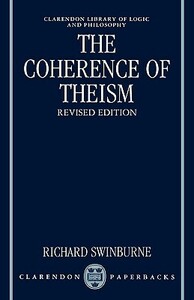Take a photo of a barcode or cover
Seems solid. A lot of it was hard to digest. Some was interesting. Some points were about things I'd never thought about, but were obviously real philosophic issues because he brought up the primary sources of whoever proposed the opposite view.
challenging
informative
medium-paced
informative
reflective
slow-paced
Very mixed feelings about this one. I've heard about Swinburne for years as one of the premier philosophers of religion. As a result, I guess I should've had more realistic expectations when approaching this book: namely, that it would be more dry and difficult (but not dull) to get through than I first anticipated. After all, this is not written as a popular, layperson's text so much as a contribution to the body of philosophical work read primarily by other people who've devoted their lives to this field of study.
There are a lot of valid points here and I appreciate him taking a more modest goal for his project. Proving theism is a coherent system is way less of a tall order than mounting a defense of any given religion's specific claims itself. I liked his introductory work about why such a project is viable more so than the defense of theism itself; it started to feel pretty "how many angels can dance on the head of a pin" after he started dealing with more blatantly theological matters. But his initial points about logical positivism and naturalism's self-defeating logic were prescient and warranted this kind of theological thinking later on. And I definitely think there's a place for this kind of philosophical, Aquinas-approved, unconcerned-with-pragmatism speculation. But I can't pretend that sort of thing is more a sedative than anything else.
Even in my most doubtful days, I've always thought the idea of theism is, bare minimum, coherent, and I think Swinburne did a good job showing why here. As another reviewer mentioned, it's not that the book was bad, it's just that it wasn't the book I expected to read. Basically, it's an uphill, dreary walk the whole time, but not a waste of time.
There are a lot of valid points here and I appreciate him taking a more modest goal for his project. Proving theism is a coherent system is way less of a tall order than mounting a defense of any given religion's specific claims itself. I liked his introductory work about why such a project is viable more so than the defense of theism itself; it started to feel pretty "how many angels can dance on the head of a pin" after he started dealing with more blatantly theological matters. But his initial points about logical positivism and naturalism's self-defeating logic were prescient and warranted this kind of theological thinking later on. And I definitely think there's a place for this kind of philosophical, Aquinas-approved, unconcerned-with-pragmatism speculation. But I can't pretend that sort of thing is more a sedative than anything else.
Even in my most doubtful days, I've always thought the idea of theism is, bare minimum, coherent, and I think Swinburne did a good job showing why here. As another reviewer mentioned, it's not that the book was bad, it's just that it wasn't the book I expected to read. Basically, it's an uphill, dreary walk the whole time, but not a waste of time.
